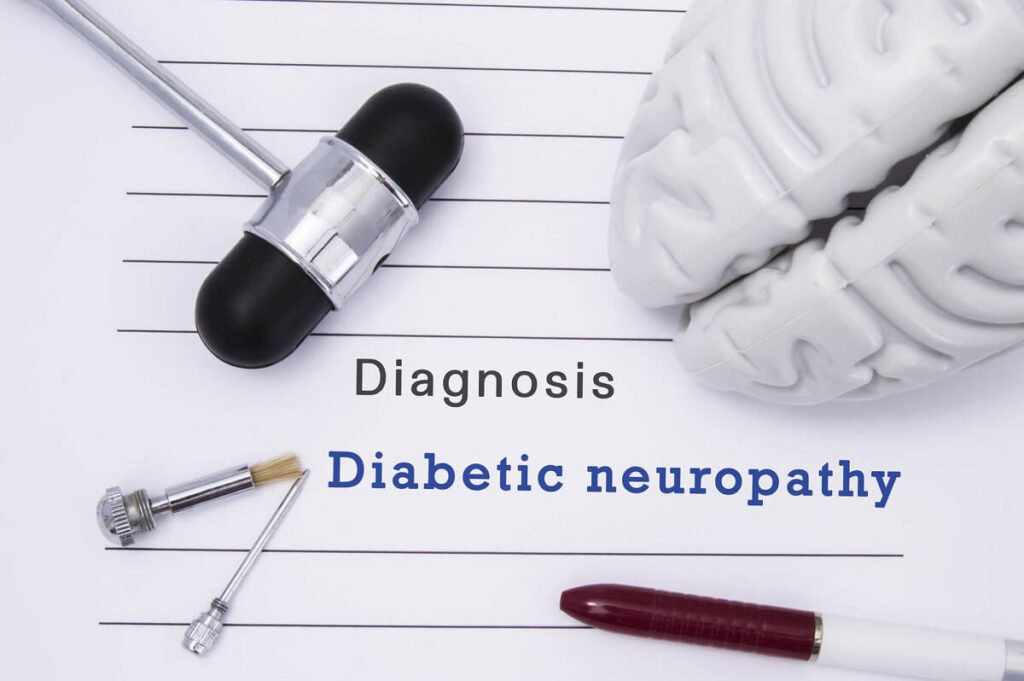
The Best Diet For Peripheral Neuropathy & Diabetic Neuropathy!
Scientifically Recommended Anti-Inflammatory Best Diet for Peripheral Neuropathy & Diabetic Neuropathy
More than 20 million Americans are living with some form of peripheral neuropathy and diabetic neuropathy, which are damaged nerve conditions that cause tingling, numbness, and nerve pain. Diabetes is the most common cause of neuropathy, accounting for up to 60% of diabetic neuropathy cases.
The best diet for neuropathy can significantly benefit patients with nerve pain and diabetic neuropathy.
Peripheral neuropathy or diabetic neuropathy is nerve damage that can cause numbness, tingling, nerve pain, and weakness.
Diabetes is the most common cause of nerve damage and neuropathy. Still, it can also be caused by obesity, thyroid disease, alcohol use disorder, chemotherapy, systemic disease, injury or trauma from external agents, infections and illness, drugs, hormonal imbalances, vitamin deficiencies, nutritional deficiencies, poison exposure, tumors, or autoimmune disorders affecting nerve tissue, among other things.
Understand more about nerve damage and discover some scientific and genuine facts about peripheral neuropathy here!
While scientifically proven natural treatments (all herbal) and impactful and successful alternative therapies & exercises can help, did you know that the foods you eat can impact your neuropathy symptoms?
Neuropathy and food have long been linked, with medical researchers, doctors, and dietitians believing that a balanced diet helps prevent or decrease the growth of neuropathy.
Because nerves require nourishment to improve their overall health, dietary improvements are usually included in neuropathy treatment plans.
Patients with nerve damage and neuropathic pain can benefit significantly from a healthful anti-inflammatory diet. But, of course, you should always discuss your dietary restrictions with your doctor or healthcare professional before making any modifications.
If you are suffering from nerve pain and nerve damage due to peripheral neuropathy or diabetic neuropathy, you must be looking for information about the following queries:
►Best anti-inflammatory diet for neuropathy!
►Best anti-inflammatory diet for nerve damage!
►Best anti-inflammatory diet for nerve pain!
►What is the best diet for peripheral neuropathy?
►What foods are good for peripheral neuropathy?
►Can diet affect peripheral neuropathy?
►What foods to avoid with peripheral neuropathy?
►What not to eat when you have peripheral neuropathy?
►What foods help peripheral neuropathy?
►What is the proper diet for peripheral neuropathy?
►The best-recommended diet for peripheral neuropathy!
►Required nutrition supplements for peripheral neuropathy!
Please discover the latest medical studies on how to make good dietary choices to help prevent or slow the progression of nerve damage, peripheral neuropathy, and diabetic neuropathy below.
Discover the Importance of the Best Diet for Peripheral Neuropathy
As with many diseases, what you eat can significantly impact the neuropathic pain and the extent to which it develops. Therefore, the best approach to neuropathy nutrition is from two angles:
►Foods you should avoid if you are suffering from neuropathy!
►Foods you should include if you have neuropathy!
You should make changes to your diet that can help improve neuropathy pain and nerve inflammation.
Doctors are learning that one of the best ways to reduce inflammation and nerve pain is to eat anti-inflammatory food and diet. By following an anti-inflammatory best diet for peripheral neuropathy, you can fight off inflammation for good. In addition, these foods will help you experience peripheral neuropathy symptoms less frequently and with mitigated intensity.
One of the best and most natural ways to help your diabetic neuropathy is through the foods you eat.
Besides the fact that eating healthy and the best diet for peripheral neuropathy is suitable for the body so many ways, a well-balanced diet of fruits, vegetables, whole grains, lean protein, and omega-3-rich foods will immensely help you to reduce the agony of your neuropathic pain.
These are the most anti-Inflammatory foods and a crucial part of the best diet for peripheral neuropathy that you can eat and enjoy a healthy life.
Alleviate Nerve Pain With the Best Diet For Neuropathy By Eating These Anti-Inflammatory Foods!
Here are six categories of foods
that fight inflammation and are recommended to enrich your anti-inflammatory diet to reduce levels of inflammation and nerve pain in your body:
►1. Phytonutrients for Neuropathy
Phytonutrients, also called phytochemicals, are natural chemicals produced by plants. Plants use phytonutrients to stay healthy. Phytonutrients can also provide significant benefits for humans who eat plant foods. Phytonutrients are potent antioxidants and have anti-inflammatory properties. Phytonutrients may also enhance immunity and intercellular communication and repair DNA damage from exposure to toxins.
What foods provide Phytonutrients?
֎ Red, orange and yellow vegetables and fruit (such as tomatoes, carrots, peppers, squash, peaches, mangos, melons, citrus fruits, and berries)
֎ Dark green leafy vegetables (such as spinach, kale, bok-choy, broccoli, swiss chard, and romaine lettuce)
֎ Garlic, onions, chives, and leeks
֎ Whole grain products (such as brown rice, wild rice, quinoa, barley, wheat berries, and whole wheat, whole-grain loaves of bread, and whole-grain cereals)
֎ Nuts and seeds (such as walnuts, almonds, sunflower, sesame, and flax seeds)
֎ Legumes (such as dried beans, peas, lentils, soybeans, and soy products)
֎ Tea and coffee (such as green tea, black tea, and other herbal teas)
֎ Dark chocolate: dark chocolate (in moderate amounts) is an excellent choice for combating stress. The compound in dark chocolate that boosts your mood is called anandamide and helps your body deal with stress better.
►2. Omega 3 Fatty Acids for Neuropathy
A new study published in the Journal of Neuroscience suggests that omega-3 fatty acids could play a significant role in speeding recovery from nerve injury.
The study focused on peripheral nerve cells. Peripheral nerves transmit signals between the brain, spinal cord, and the rest of the body.
Research from Queen Mary, University of London suggests that omega-3 fatty acids, which are found in fish oil, have the potential to protect nerves from injury and help them to regenerate.
What foods provide Omega 3 Fatty Acids?
Omega-3s are found naturally in some foods. You can get adequate amounts of omega-3s by eating a variety of foods, including the following:
● Fish and other seafood (especially cold-water fatty fish, such as salmon, mackerel, tuna, herring, and sardines)
● Nuts and seeds (such as flaxseed, chia seeds, and walnuts)
● Plant oils (such as flaxseed oil, soybean oil, olive oil, and canola oil)
● Fortified foods (such as certain brands of eggs, yogurt, juices, milk, soy beverages, and infant formulas)
► 3. Whole Grains are an Important Component of the Best Diet for Peripheral Neuropathy
Whole grains are an abundant source of essential nutrients such as protein, iron, fiber, magnesium, phosphorus, zinc, copper, and vitamins. They typically contain low levels of fat and keep you fuller longer. In addition, complex sugars within whole grains stabilize blood sugar and promote brain development — all good things for your diabetic neuropathy.
Whole Wheat Grain Foods:
● Oats, preferably Oat straw extract – Oatmeal is a beautiful way to start your day
● Whole Wheat
● Brown Rice
● Corn
● Whole Wheat Couscous
► 4. Vitamins for Peripheral Neuropathy & Diabetic Neuropathy
Vitamin B-12 is a significant component of the best diet for neuropathy
What is vitamin B12, and what does it do?
Vitamin B12 is a nutrient that helps keep the body’s nerve and blood cells healthy and helps make DNA, the genetic material in all cells. Vitamin B12 also helps prevent a type of anemia called megaloblastic anemia that makes people tired and weak.
Vitamin B-12 is essential to nerve and red blood cell development. Although the vitamin B family is a significant component in maintaining a healthy nervous system, B-12 is the one micronutrient to key in on. It is integral to creating the myelin sheath that encapsulates nerve fibers.
What foods provide vitamin B12?
Vitamin B12 is found naturally in a wide variety of vegetables, fruits, and animal foods and is added to some fortified foods. You can get recommended amounts of vitamin B12 by eating a variety of foods, including the following:
● Milk– Milk is a good source of vitamin B12.
● Cheese is one of the best vegetarian sources of vitamin B12. Feta cheese, parmesan cheese, and mozzarella cheese are just a few alternatives.
● Yogurt – Vitamin B12 is abundant in yogurt.
● Vegetables– While most vegetables include some vitamin B12, some of them, such as spinach, beetroot, potatoes, mushrooms, alfalfa, and others, provide a relatively high level of vitamin B12.
● Fruits– While fruits do not include vitamin B12, some fruits, such as bananas, apples, and berries, contain a trace quantity of this vitamin.
● Beef liver and clams are the best sources of vitamin B12.
● Fish, meat, poultry, eggs, milk, yogurt, and other dairy products, also contain vitamin B12.
Vitamin B-1 for Neuropathy
Benfotiamine is the best vitamin for nerve growth and nerve healing. Thus, benfotiamine plays a vital role in protecting the peripheral nerves and brain from the harm of diabetic neuropathy.
Food with Vitamin B1:
There are high concentrations of Vitamin B1 in the outer layers and germ of cereals, as well as in yeast, beef, pork, liver, eggs, nuts, whole grains, and pulses.
Fruit and vegetables that contain it include peas, cauliflower, oranges, asparagus, and kale.
Vitamin B-6 for Neuropathy – Pyridoxine strongly contributes to the proper functioning of the nervous system by facilitating neurotransmitter and myelin synthesis. In addition, vitamin B-6 may help to maintain the covering of nerve endings.
Good sources of vitamin B6:
Vitamin B6 is found in various foods, including pork, and poultry, such as chicken or turkey, some fish, peanuts, soya beans, wheat germ, oats, milk, etc.
► 5. Alpha-Lipoic Acid is an essential component of the best diet for peripheral neuropathy:
Alpha-Lipoic Acid helps in three potent ways:
Alpha-lipoic acid has been shown to affect nerve conduction and positively reduce neuropathic pain. Alpha-lipoic acid improves nerve blood flow, reduces oxidative stress, and improves distal nerve conduction. As a result, it helps reduce nerve pain, numbness, tingling, prickling, and abnormal sensations caused by nerve damage.
This potent antioxidant has serval unique properties that promote healthy blood sugar levels. In addition, it’s said to lower blood sugar and helps maintain nerve health.
Alpha-lipoic acid neutralizes free radicals (which damage healthy tissue) and reduces oxidative stress (the imbalance of free radicals and the body’s ability to fight them). In simpler words, alpha-lipoic acid is beneficial to those with diabetic neuropathy also because it combats free radicals.
Can you get alpha-lipoic acid naturally from foods?
Many foods contain alpha-lipoic acid but in low amounts; you need more if you already have neuropathy. They include spinach, broccoli, yeast, tomatoes, Brussels sprouts, carrots, beets, and rice bran. Red meat- particularly organ meat- is also a source of alpha-lipoic acid.
Alpha-Lipoic Acid: Supplement to Help Relieve Neuropathy Symptoms
These food items provide alpha-lipoic acid in low amounts, mainly enough to keep you healthy. But if you already suffer from peripheral or diabetic neuropathy, you must opt for a supplement. We’ve noticed that alpha-lipoic, combined with other supplements, has been a significant factor in helping neuropathy patients get better.
►6. Benefits of L-arginine for Neuropathy!
What foods provide arginine?
The following foods are natural sources of arginine: Nuts, Seeds, Dairy Products, Meat, Whole Grains, etc.
Regular food consumption, as mentioned earlier, will help you avoid L-arginine deficiency.
L Arginine: Supplement to Help Relieve Neuropathy Symptoms:
L Arginine dramatically affects the nerve by dilating the blood vessel, which means opening up the blood vessel that supplies the nerves and increasing the oxygen supply to the nerves so that the damaged nerves can naturally heal themselves.
But if you are already suffering from peripheral neuropathy or diabetic neuropathy, then you must take L-arginine supplements also. This is because it has a solid and profound effect on treating neuropathy
List of Foods that cause Inflammation and to be Avoided for Neuropathy Recovery:
►1. Gluten – A strict gluten-free diet may protect against peripheral neuropathic pain associated with gluten sensitivity, according to researchers in England.
A strict gluten-free diet removes the main factor triggering the inflammation, allowing the immune response to calm down and alleviating the neuropathic symptoms, including pain.
To avoid this inflammatory substance, choose gluten-free options. Consuming gluten when your body cannot properly digest it can lead to inflammation, which worsens the nerve inflammation and nerve pain seen in peripheral neuropathy patients.
►2. Refined grains – Refined grain of any sort is high on the glycemic scale and will increase your blood glucose level. Maintaining a healthy blood sugar count is critical to treating diabetic neuropathy and general health.
►3 Alcohol – As a neurotoxin, alcohol has the potential to damage your nerves. Even a healthy person who drinks too much can begin experiencing symptoms such as numbness, nerve pain, and tingling in their hands or feet, known as alcoholic neuropathy.
►4. Sugars & additives – While it is generally accepted that added sugar has adverse health effects, this can especially be true where peripheral neuropathy and diabetic neuropathy is concerned. Eating a lot of added sugar will increase your blood sugar levels, damaging the nerves and the blood vessels that feed nerves.
►5. Salty Snacks Foods with a high sodium level can be particularly problematic as the amount of salt can restrict blood flow, contributing to numbness as a symptom of peripheral neuropathy. Potato chips, cold cuts, and fast food are all exceptionally high in sodium and should be avoided whenever possible.
►6. Trans and Saturated Fats, Known as “unhealthy fats,” can be found in most fatty meats and high-fat dairy products. When consumed in excess, these fats lead to inflammation and increase the risk for type 2 diabetes, both exacerbating peripheral neuropathy.
►7. Dairy products and high-fat meats should be strictly limited. The saturated fat they contain increases the risk of various chronic diseases and exacerbates inflammation.
Eating the best diet for neuropathy, restoring your health, and remaining healthy and nerve pain-free is relatively easy. And it becomes easy once you have the scientifically proven proper knowledge and effective products to treat yourself.
One of the most important things you can also do is select appropriate neuropathy shoes, insoles, house slippers, and socks as per your style, minimize pain & discomfort, and live a pain-free life.
Can Peripheral Neuropathy be Prevented or Avoided?

How to Prevent or Avoid Peripheral Neuropathy:
You can learn how to prevent neuropathy in the next few minutes by reading the information in this article. By practicing below mentioned healthy practices, exercises, and eating an anti-inflammatory diet, you can prevent and prevent neuropathy and diabetic neuropathy.
Your lifestyle choices can be essential in preventing nerve damage, nerve pain, and peripheral neuropathy. You can avoid and reduce your risk of neuropathy by treating existing medical problems and adopting healthy living habits.
Discover the facts of peripheral neuropathy here, straightforwardly and transparently!
If you already suffer from peripheral neuropathy or diabetic neuropathy, start eating a healthy diet and begin the natural treatments, all herbal, homeopathy, and alternative therapy & exercises (mentioned at the end of this article).
How to Prevent Neuropathy (Peripheral Neuropathy & Diabetic Neuropathy).
You can reduce your risk of nerve damage, nerve pain, and neuropathy by following these healthy practices in your daily life:
№ 1. Laughter is the best medicine; it relieves stress and anxiety. Laughter can reduce the level of stress hormones, in turn cutting off stress and anxiety. Additionally, reducing stress hormones in your body may produce a higher immune system performance!
It increases blood flow to the nerves, supplying them with oxygen and nutrition. In addition, laughter triggers the release of endorphins, your mind’s natural feel-good chemicals.
№ 2. Stay active and exercise regularly, several times a week. The American Heart Association and the American Diabetes Association generally recommend about 30 minutes of moderate exercise daily at least five times a week.
Staying active will keep your heart in shape and your arteries from hardening, helping the circulation to the nerves in your hands and feet.
Brisk walking combats pain in many different ways. It helps blood flow to nerves and tissues and checks blood sugar levels, which may slow nerve damage. This is one of the best ways to prevent nerve pain, peripheral neuropathy, and diabetic neuropathy.
Brisk walking also increases blood flow to the arms and legs and keeps the nerves well-nourished and healthy. Plus, it boosts your mood and relieves stress, so you can better deal with the discomfort.
№ 3. Water also plays a vital role in the proper functioning of nerves. For nerves to transmit messages, sufficient water must circulate in the neural pathways.
When water levels are low in your body, nerve function is disrupted. Health experts recommend a diet rich in antioxidants and staying hydrated with enough water to reduce inflammation.
Water is recommended explicitly because it can flush toxins and other irritants out of the body.
№ 4. Eat a healthy and balanced diet, and exercise several times a week. The healthy living tips keep your muscles strong and supply your nerves with the oxygen and nutrients they need to remain healthy.
№ 5. Eating food that reduces inflammation. Remember, it is imperative to include fatty fish, such as salmon (caught wild) and tuna, flaxseed, and fruits and vegetables, in your daily food choices and to avoid fats to keep your nerves and arteries healthy and prevent hardening in your arteries.
Fatty fish, berries, cherries, grapefruit, broccoli, avocado, green tea, olive oil, dark chocolate, and cocoa have anti-inflammatory properties.
№ 6. Strictly avoid foods like sugar-sweetened beverages that have been shown to promote inflammation.
There are other examples of foods that have been linked to increased levels of inflammation: junk foods (fast food, potato chips, pretzels), refined carbohydrates (white bread, pasta, white rice, crackers, flour tortillas, biscuits), fried foods (French fries, donuts, fried chicken, mozzarella sticks), processed meats (bacon, beef jerky, canned meat, salami, hot dogs, smoked meat, trans fats (shortening, partially hydrogenated vegetable oil, margarine), etc.
№ 7. You can prevent peripheral neuropathy by correcting these vitamin deficiencies: vitamin B1 (benfotiamine), vitamin B6, vitamin B-12 (methylcobalamin), vitamin E, and vitamin D keep the nerves healthy.
№ 8. Strictly keep alcoholic drinks to a minimum.
№ 9. Stop smoking forever: Smoking constricts blood vessels that supply nutrients to nerves. Without proper nutrition, nerves become unhealthy and may lead to peripheral neuropathy.
№ 10. Stay strictly within your ideal weight range. Obesity, prediabetes, diabetes & neuropathy tend to cluster together in people. If you are obese, take immediate steps to lose weight with the help of exercise & natural weight loss treatment (approved by the doctors).
№ 11. Avoid exposure to toxins and harmful chemicals.
№ 12. Review your medications: Talk with your doctor or pharmacist about all the medicines and over-the-counter products you take.
Ask if any of them are known to cause or worsen neuropathy. If so, ask if a different medication can be tried.
№ 13. Suppose you have kidney disease, diabetes, or other chronic health condition. In that case, working with your doctor to control your situation is crucial, which may prevent or delay the onset of peripheral neuropathy.
№ 14. Controlling blood glucose levels. If you have diabetes, keep your blood glucose level within the range recommended by your doctor.
Diabetic neuropathy and diabetic nerve pain are common complications of diabetes. Therefore, it is essential to be aware of the risk of this condition and its symptoms.
№ 15. Wash your feet every day with lukewarm water and mild soap. Keep feet clean and dry. Cut your toenails with caution. Protect your feet from heat and cold. Don’t walk barefoot, even in your house; wear neuropathy slippers.
№ 16. Wear the best neuropathy shoes, house slippers, and neuropathy socks as mentioned below:
►Select the best neuropathy shoes to mitigate your foot pain and leg pain based on your fashion sense to enable you to reduce distress and suffering and live a pain-free life.
►Find the information about the best neuropathy insoles to minimize nerve damage and nerve pain.
►Learn about the best neuropathy house slippers to avoid walking barefoot and damaging your feet further.
►Get knowledge about the best neuropathy socks to improve healthy blood flow to your damaged nerves in painful feet.
It is imperative to wear shoes & house slippers that protect your feet. Also, could you ensure your shoes fit well, especially around your toes?
Could you ensure your socks are always clean to avoid infection and fungus? In addition, good orthopedic shoes will help support your feet and protect them from injuries.
Can Diabetic Neuropathy be Prevented or Avoided?

How to Prevent and Avoid Diabetic Neuropathy:
Diabetic neuropathy is a common complication of diabetes. Always consult your physician, but the following general suggestions can help in the prevention and reduce the risk of diabetic neuropathy:
№ 1. To prevent diabetic neuropathy, managing your blood glucose, blood pressure, and cholesterol levels are essential. Get an A1C (a lab test) at least twice yearly to determine your average blood sugar for the past 2 to 3 months.
№ 2. Watch your weight to avoid diabetic neuropathy. Obesity is one of the most crucial causes of diabetes. Obesity, prediabetes, diabetes & diabetic neuropathy tend to congregate together in people.
A person is obese if their body mass index (BMI) exceeds 30 and overweight if it is greater than 25. A BMI over 25 puts a person with diabetes at greater risk for diabetic neuropathy.
Discover here to find out how to reduce your weight naturally, maintain a healthy weight,
how to reduce your weight naturally and maintain a healthy weight and live a healthy lifestyle (if you are overweight).
№ 3. Exercise regularly and stay active. The American Heart Association and the American Diabetes Association generally recommend about 30 minutes of moderate exercise daily at least five times a week.
Staying active will keep your body in shape and maintain a healthy heart. That will prevent your arteries from hardening, help blood circulation, and supply oxygen and nutrients to the nerves in your hands and feet.
№ 4. Eat healthy food every day. Remember, it is crucial to include nuts, fruits, and vegetables in your daily food choices and to avoid fats and junk food to keep your nerves and arteries healthy and prevent hardening in your arteries.
№ 5. Stop Smoking forever. Smoking damages your heart and lungs and hardens your arteries, making blood flow to your feet more difficult.
№ 6. Limit alcoholic drinks to one drink per day for women and no more than two for men.
№ 7. Always wear good shoes and slippers (at home). It is crucial to wear shoes that protect your feet.
Could you make sure your shoes fit well, especially around your toes? If you wear the wrong shoes regularly, ultimately, they may cause nerve damage and peripheral neuropathy.
Could you ensure your socks are always clean to avoid infection and fungus? In addition, good neuropathy shoes will help support your feet and protect them from injuries.
Discover more about the best neuropathy shoes and insoles here.
Learn more about ideal neuropathy slippers here.
Find more about the best neuropathy socks here.
I earnestly hope that in the future, doctors will no longer treat the human body with drugs but rather cure and prevent disease with good nutrition & exercise and educate their patients about how to stay healthy and prevent peripheral neuropathy and diabetic neuropathy and other conditions.
If you have already been diagnosed with peripheral neuropathy or diabetic neuropathy, then don’t wait to get your painful condition worse.
Pain is a warning, and you should learn lessons from it! Neuropathic pain and misery are preventable, correctable, and, best of all, reversible.
It is a fact that the regeneration of injured nerves requires many tactics, actions, and measures taken together and combined at once. Therefore, it would help if you started taking one or more of the following scientifically proven & effective treatments for your peripheral neuropathy and diabetic neuropathy:
►Medically approved and time-tested safe and effective total herbal treatment to rejuvenate injured nerves & reverse peripheral neuropathy, idiopathic neuropathy, and diabetic neuropathy.
►The best natural treatment for nerve damage PEMF– Magnetic Therapy for neuropathy is an effective and medically proven nerve pain reliever to cure and reverse peripheral, idiopathic, and diabetic neuropathy.
And also, try to add hypnotherapy as a form of complementary therapy and Alternative Pain Management program to produce additive or potentiated positive health effects.
But you must combine these natural treatments and alternate therapy with the following healthy practices to get speedy results, stop nerve damage nerve pain, and eliminate and finally reverse your peripheral neuropathy and diabetic neuropathy:
► Find everything you need to know about foot pain and leg pain, including how to do the
Best feet & leg exercises!
► For hand pain and arm pain, discover and start doing the best hand & finger exercises!
You can halt or manage your neuropathy naturally using medically proven and successful natural treatments and alternative therapies. You will eventually be able to cure and reverse it. These natural therapies do not require prescriptions, are cost-effective, drug-free, and have no side effects.
Follow the above-mentioned healthy life practices, start the treatments, and live the healthy life of your choice!

Affiliate Disclosure “If you buy through links on our site, we may earn an affiliate commission, no worries though, you’ll still pay the standard amount so there’s no cost on your part. However, please know this does not impact our reviews and product information. We try to keep things fair and balanced to help you make the best choice for your needs. This keeps it 100% reader-supported and free of advertisements or sponsorships. Thanks for your support!”
Medical Disclaimer:
All content and media on this Website are created and published
online for informational purposes only. It is not intended to be a substitute
for professional medical advice and should not be relied on as health or
personal advice.
Always seek the guidance of your doctor or other qualified
health professional with any questions you may have regarding your health or a
medical condition. Never disregard the advice of a medical professional, or
delay in seeking it because of something you have read on this Website.


